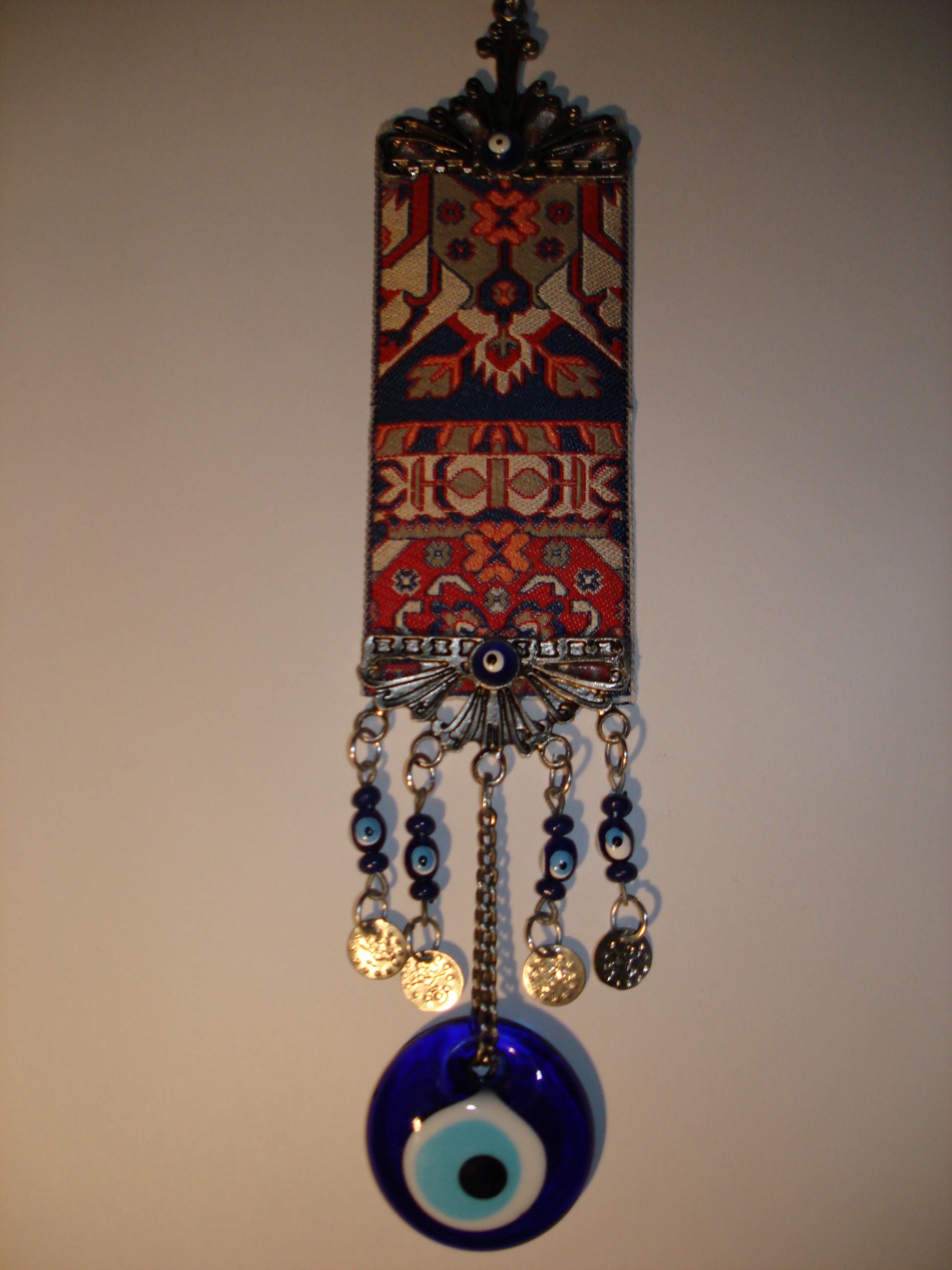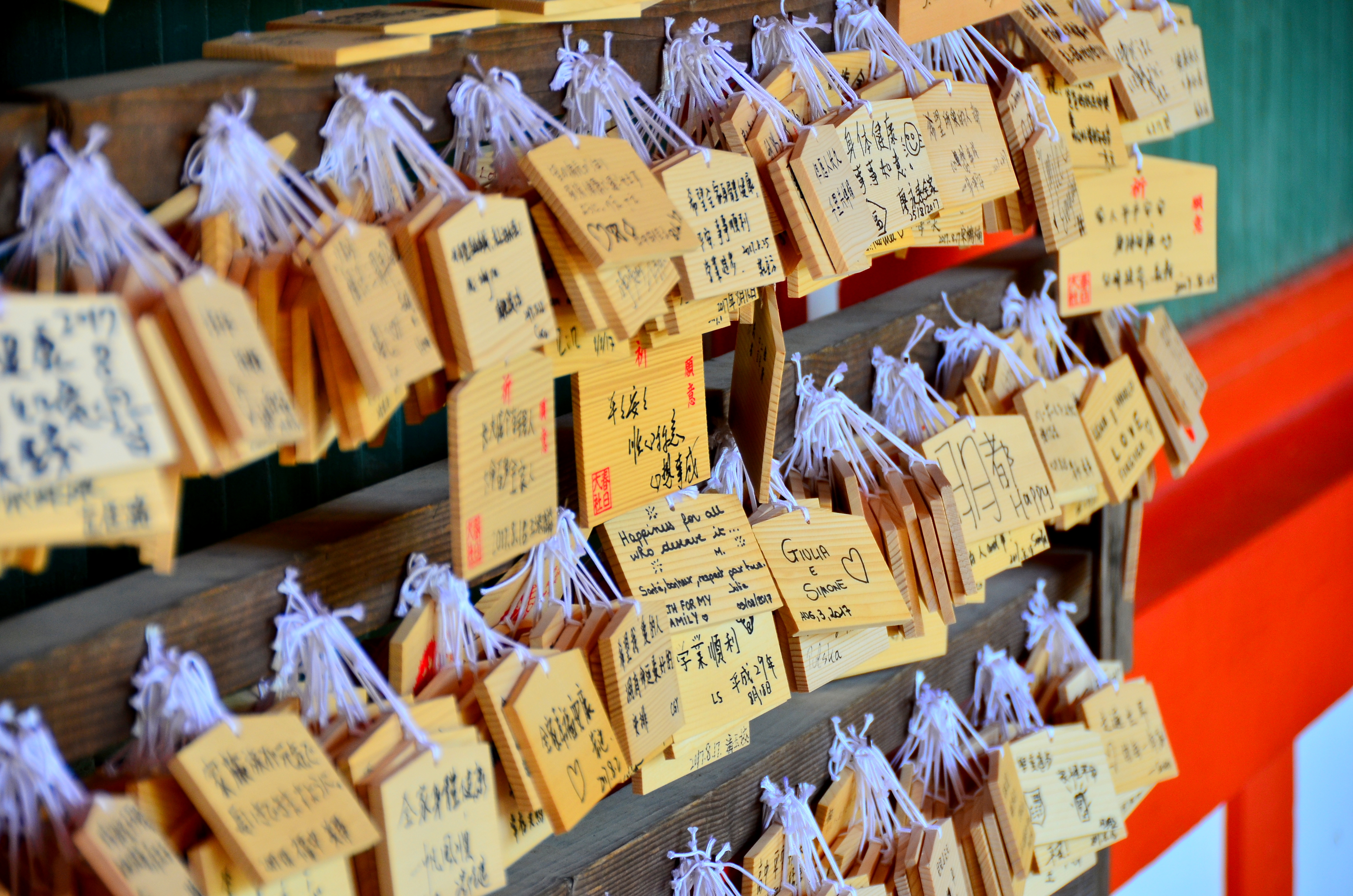|
Kanai Anzen
Kanai Anzen (家内安全) is a type of omamori, or Japanese amulet of the Shinto Shinto () is a religion from Japan. Classified as an East Asian religion by scholars of religion, its practitioners often regard it as Japan's indigenous religion and as a nature religion. Scholars sometimes call its practitioners ''Shintois ... religion. Its purpose is to promote good health and to help those with illnesses. Literally, ''kanai anzen'' means "Please keep my family from harm," and this can be seen written upon ema as well as omamori suzu (bells). In the form of an omamori and suzu, this prayer is carried on one's person. References Shinto Amulets Superstitions of Japan {{Shinto-stub ... [...More Info...] [...Related Items...] OR: [Wikipedia] [Google] [Baidu] |
Omamori
are Japanese amulets commonly sold at Shinto shrines and Buddhist temples, dedicated to particular Shinto as well as Buddhist figures, and are said to provide various forms of luck and protection. Origin and usage The word means 'protection', with being the (honorific) form of the word. Originally made from paper or wood, modern amulets are small items usually kept inside a brocade bag and may contain a prayer, religious inscription of invocation. are available at both Shinto shrines and Buddhist temples with few exceptions and are available for sale, regardless of one's religious affiliation. are then made sacred through the use of ritual, and are said to contain (spiritual offshoots) in a Shinto context or (manifestations) in a Buddhist context. While are intended for temple tourists' personal use, they are mainly viewed as a donation to the temple or shrine the person is visiting. Visitors often give as a gift to another person as a physical form of well-wishi ... [...More Info...] [...Related Items...] OR: [Wikipedia] [Google] [Baidu] |
Japan
Japan ( ja, 日本, or , and formally , ''Nihonkoku'') is an island country in East Asia. It is situated in the northwest Pacific Ocean, and is bordered on the west by the Sea of Japan, while extending from the Sea of Okhotsk in the north toward the East China Sea, Philippine Sea, and Taiwan in the south. Japan is a part of the Ring of Fire, and spans Japanese archipelago, an archipelago of List of islands of Japan, 6852 islands covering ; the five main islands are Hokkaido, Honshu (the "mainland"), Shikoku, Kyushu, and Okinawa Island, Okinawa. Tokyo is the Capital of Japan, nation's capital and largest city, followed by Yokohama, Osaka, Nagoya, Sapporo, Fukuoka, Kobe, and Kyoto. Japan is the List of countries and dependencies by population, eleventh most populous country in the world, as well as one of the List of countries and dependencies by population density, most densely populated and Urbanization by country, urbanized. About three-fourths of Geography of Japan, the c ... [...More Info...] [...Related Items...] OR: [Wikipedia] [Google] [Baidu] |
Amulet
An amulet, also known as a good luck charm or phylactery, is an object believed to confer protection upon its possessor. The word "amulet" comes from the Latin word amuletum, which Pliny's ''Natural History'' describes as "an object that protects a person from trouble". Anything can function as an amulet; items commonly so used include statues, coins, drawings, plant parts, animal parts, and written words. Amulets which are said to derive their extraordinary properties and powers from magic or those which impart luck are typically part of folk religion or paganism, whereas amulets or sacred objects of formalised mainstream religion as in Christianity are believed to have no power of their own without faith in Jesus and being blessed by a clergyman, and they supposedly will also not provide any preternatural benefit to the bearer who does not have an appropriate disposition. Talisman and amulets have interchangeable meaning. Amulets refer to any object which has the power to av ... [...More Info...] [...Related Items...] OR: [Wikipedia] [Google] [Baidu] |
Shinto
Shinto () is a religion from Japan. Classified as an East Asian religion by scholars of religion, its practitioners often regard it as Japan's indigenous religion and as a nature religion. Scholars sometimes call its practitioners ''Shintoists'', although adherents rarely use that term themselves. There is no central authority in control of Shinto, with much diversity of belief and practice evident among practitioners. A polytheistic and animistic religion, Shinto revolves around supernatural entities called the . The are believed to inhabit all things, including forces of nature and prominent landscape locations. The are worshiped at household shrines, family shrines, and ''jinja'' public shrines. The latter are staffed by priests, known as , who oversee offerings of food and drink to the specific enshrined at that location. This is done to cultivate harmony between humans and and to solicit the latter's blessing. Other common rituals include the dances, rites of pass ... [...More Info...] [...Related Items...] OR: [Wikipedia] [Google] [Baidu] |
Ema (Shinto)
are small wooden plaques, common to Japan, in which Shinto and Buddhist worshippers write prayers or wishes. are left hanging up at the shrine, where the (spirits or gods) are believed to receive them. Typically wide and tall, they often carry images or are shaped like animals, or symbols from the zodiac, Shinto, or the particular shrine or temple. In ancient times, people would donate horses to the shrines for good favor; over time this was transferred to a wooden plaque with a picture of a horse, and later still to the various wooden plaques sold today for the same purpose. Once inscribed with a wish, are hung at the shrine until they are ritually burned at special events, symbolic of the liberation of the wish from the writer. History In some early Shinto and folk traditions of Japan, horses were seen as carrying messages from the , and were usually used to transmit requests during droughts or famines. Horses were extremely expensive, and figures made of clay or wood ... [...More Info...] [...Related Items...] OR: [Wikipedia] [Google] [Baidu] |
Suzu (bell)
are round, hollow Japanese Shinto bells that contains pellets that sound when agitated. They are somewhat like a jingle bell in form, though the materials produce a coarse, rolling sound. come in many sizes, ranging from tiny ones on good luck charms (called ) to large ones at shrine entrances. are, however, classified as small bells, since big bells are referred to as . The former is associated with Shinto and shrines while the latter is related to Buddhist temples and ceremonies. At Shinto shrines, large drape over entrances, as it is said that ringing them calls , allowing one to acquire positive power and authority, while repelling evil. Handheld clustered , similar to jingle bells, are used musically at Shinto ceremonies. There are ceremonies, for instance, where female performers dance with bells such as those with some sort of short blade at their center. The bell's cool tinkles are also considered psychological air-conditioning for the summer since their clear ... [...More Info...] [...Related Items...] OR: [Wikipedia] [Google] [Baidu] |
Amulets
An amulet, also known as a good luck charm or phylactery, is an object believed to confer protection upon its possessor. The word "amulet" comes from the Latin word amuletum, which Pliny's ''Natural History'' describes as "an object that protects a person from trouble". Anything can function as an amulet; items commonly so used include statues, coins, drawings, plant parts, animal parts, and written words. Amulets which are said to derive their extraordinary properties and powers from magic or those which impart luck are typically part of folk religion or paganism, whereas amulets or sacred objects of formalised mainstream religion as in Christianity are believed to have no power of their own without faith in Jesus and being blessed by a clergyman, and they supposedly will also not provide any preternatural benefit to the bearer who does not have an appropriate disposition. Talisman and amulets have interchangeable meaning. Amulets refer to any object which has the power to ave ... [...More Info...] [...Related Items...] OR: [Wikipedia] [Google] [Baidu] |





